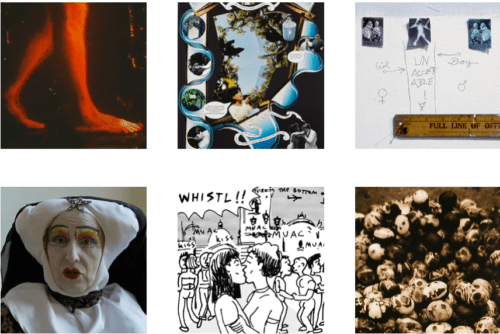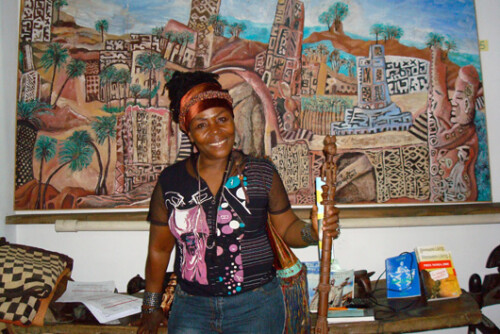II. “Eat Da Poo Poo”
Sewage systems in piped societies elicit disgust and anxiety about waste, and they produce complex technocultural efforts to manage perceived excesses that crisscross public/private divides. As a set of controlling moves and stigmas, copropower also extends to the bodies and practices of minoritized publics, where shit’s embeddedness in carnal life becomes foregrounded in global debates about gay sex. Here we tackle questions of worlding excrement’s materiality—what do we do with shit?—from another angle: what do we do with men who want to poke around in it?
In mid-2010, an internet meme/religious-right fantasy about gay sex went viral. In “Eat Da Poo Poo,” Ugandan pastor Dr. Martin Ssempa, chairman of the National Task Force Against Homosexuality in Uganda, lectured a group on what homosexuals (presumably all male) do in “the privacy of their bedrooms”: “One of the things they do is called anal licking where they, where a man’s anus is licked like this [slurping sound] by the other person, like ice cream. And then what happens, even poo poo comes out… and then they eat the poo poo.” Featured in the documentary Vanguard: Missionaries of Hate, Ssempa’s “educational” outreach was situated within larger political debates in Uganda, debates fueled by right-wing American evangelicals, that included the ultimately failed effort to make homosexuality punishable by death. 1 The video immediately inspired remixes that mocked the pastor’s fascination with this exaggerated image of gay sexual practices and his AV presentations that included graphic images of coprophagia (we say exaggerated because some people really do fetishize and eat shit).
The satirical hacks of Ssempa’s lectures poke fun at what Ssempa is saying and how he says it. In his good but accented English, “They eat the poo poo” sounds like “Dey eat da poo poo.” Combined with the euphemistic term for excrement that evokes a childhood world of baby talk, the hacks seem less invested in challenging homophobia than in ridiculing the imagined backwardness of Africans. They ask, in the classic stance of imperialist racism, “Who would really believe that this is what most gay people do, ‘eat da poo poo like ice cream’?”
One way of reading these remixes is to understand them, and the documentary that served as source material, as reproducing homonationalist ideas about the West’s sexual exceptionalism, ideas that simultaneously posit a liberal, sanitized homonormative subject deserving of political inclusion and a racialized, sexually abjected other who represents death and terror. 2 Ssempa’s comments are situated in relation to both Western sexual exceptionalism and racist ideas about Black sexuality, including those that bind Black desire to the anus. In Jennifer Nash’s provocative formulation, “black anality” refers to “anal ideologies including spatiality, waste, toxicity, and filth.” 3 Responding to and departing from Leo Bersani’s famous “Is the Rectum a Grave?,” Nash analyzes the ways Black anality, and specifically Black female anality, is an effect of racist ideologies that see Black bodies and the spaces they inhabit as filthy. Yet, like Bersani, she simultaneously looks to the ethical and pleasurable potential of the anus as “a space that can also please, excite, and arouse, and also a locus where racial stereotype can be playfully performed and unraveled.” 4
These formulations are important for understanding the ways copropower organizes desire along axes of race and sexuality. Both homonationalism and Black anality inevitably frame the meme’s production and circulation; however, the videos themselves do not represent a coherent viewpoint. Therefore, given the peculiar character of many internet memes, we do not believe this viral phenomenon can be reduced to these terms. In other words, while the videos do serve as examples of racist sexual exceptionalism, they may also be the work of internet tricksters who intentionally reproduce these discourses in order to troll for “the lulz.” 5 What is certain is that, as the documentary from which the excerpt originates shows, these African sentiments can be directly traced to American anti-gay Christian ministries.
Specifically, the PowerPoint presentation on Dr. Ssempa’s MacBook draws on notions that have circulated widely among the anti-gay Christian Right for a quarter of a decade. The Family Research Council (FRC), a powerful, socially conservative Christian group, features many documents on their website that echo Ssempa’s comments. Articles such as “Negative Health Effects of Homosexuality” feature false, distorted, or misleading data, offering a pseudoscientific veneer to FRC anti-gay campaigns, such as the work of discredited researcher Paul Cameron, who has claimed that homosexuality is more dangerous than smoking. In an infamous, and yet still widely disseminated and reproduced, article “Medical Consequences of What Homosexuals Do,” Cameron stated that 17 percent of gays regularly consume feces, an effort to mobilize concerns about public health while rendering gays as disgusting eaters of shit—these dirty subjects contrasted with the normative fantasy of straight, healthy, reproducing biopolitical actors. 6 Some of these research papers became the object of increasingly widespread criticism, often by the very researchers whose work the FRC had liberally interpreted (in contrast to their Biblical literalism). The FRC responded to critics by removing some of the papers or including caveats that the research was outdated, although they often re-uploaded some of these documents later without these disclaimers. 7 In 2010, the Southern Poverty Law Center (SPLC) identified the FRC and several other right-wing Christian organizations as hate groups. 8
Ssempa, the FRC, and the SPLC are involved in a war of discourses and a struggle over defining conditions of political possibility: are gays misguided, deluded perverts, merely “disordered,” or are they potential citizens fully deserving of the rights, responsibilities, and consumer practices liberal citizenship entails? This war of discourses illustrates, in part, the ways people not only deal with poop in bathrooms, but in bedrooms, churches, and courtrooms. Moreover, the relationships between human excrement and gay sex are pushed into transnational circulation via complex and often opaque processes. In Missionaries of Hate, journalist Mariana van Zeller challenges protestations by Ugandans that virulently anti-gay policies were indigenous to their culture rather than the work of American evangelicals.
In the Global North, sexual orientation and gender have been central foci in the decades-old culture wars, and these categories likewise shape nationalist projects elsewhere. Queers are liminally situated in and outside the state, while national masculinities and normative sexual acts are defined and instantiated through democratic institutions, as well as nonprofit and religious groups. 9 Cultural attitudes toward homosexuality are organized with and alongside ideas about democracy, tolerance, backwardness, the West, and the state’s very reproducibility. But increasingly, as Puar has so convincingly argued, queers in the West are absorbed into imperial projects and their logics: “the celebration of the queer liberal subject as bearer of privacy rights and economic freedom sanctions a regime of racialized surveillance, detention, and deportation.” 10
In many contexts, queers have been convenient sacrificial surrogates 11 for larger cultural anxieties about sex, power, and difference. We argue that this is precisely because gay men rooting around in one another’s cavities, “eating da poo poo,” pose an inverted image of the infant or toddler whose relationship to shit is innocent, cute, natural, an image endangered or polluted by sex. Heteronormative culture wars and collective sexual identities thereby gravitate around queer poop as powerful matter that worlds differences into being, illustrating in part what Paxson calls a “microbiopolitics” of life. 12 Digestive tracts and poop operate as more than signs, as visceral reminders of cross-species interdependencies and what bodies are capable of.
Through the very efforts to police pooping bodies, poop enters ever more public modes of circulation. While counterarguments, such as those of the Southern Poverty Law Center that debunk the Moral Right, offer necessary correctives to the homophobias promulgated in the name of church and family, they also sometimes occlude the very messy materialities that stick to sex. In so doing they might manage to make gay sex seem a little cleaner than it actually is. Both the right and their critics are, to draw on Mary Douglas’s classic formulation, looking to create more order by getting rid of the dirt. The Christian Right claims that gay sex is inherently dirty and that gays are prone to disease. This explains the ongoing emphasis among the Moral Right on the need for conversion therapies “to cease homosexual practices to avoid the unacceptable health risks associated with that behavior,” as put by George Rekers, an FRC founding board member and one of many homophobic conservatives to be caught up in a gay sex scandal. 13 Gays, they say, have shorter lives, suffer from more STIs, struggle with mental illness, and “eat da poo poo.”
But by highlighting the many ways the right’s evidence is false or exaggerated or misinterpreted, defenders miss out on the ways gay men indeed have to deal with amorous encounters with shit—their own and others’. Practices associated with the management of feces in sex resemble constellations of other bodily practices, including dieting, tattooing, piercing, and cosmetic surgery, in how they seek to order or manage or express a body. Anal sex between men does indeed entail confronting excrement and its boundary-crossing liveliness. Bersani argues for the ethical potential of gay sex and the rectum specifically as sites for a productive “self-dismissal.” 14 Most gay men engage in anal sex at least sometimes, and, whether or not they are drawn to its “terrifying appeal of a loss of the ego,” 15 most make efforts toward feeling “clean,” signaling the ways shit is a source of persistent anxiety or shame for particular bodies while it is also always social and collective. We have an obligation to not only feel clean for ourselves but in relation to others.
Medical and folk wisdoms variously suggest the use of simple measures: enemas (medicated but preferably not), a healthy diet, and a little water and soap go a long way. The Ultimate Guide to Anal Sex for Men, 16 Bend Over! The Complete Guide to Anal Sex for Men, 17 and Anal Pleasure and Health: A Guide for Men, Women, and Couples, 18 as well as countless websites are resources that destigmatize (even celebrate) anal sex and educate people about bodily functions. Ask.com’s “The 6 Secrets of Gay Anal Sex” is interesting in a very general sort of way, while squarepegtoys.com offers detailed information about the physiology of the butt, with bibliographic references and personal testimonies. The author of the site, a purveyor of high-quality anal toys, discusses diets and lists an array of tricks to facilitate safe, fun, and clean play. He sagely advises those serious about deep play to become attuned to their own body’s natural rhythms, to learn about the physiology of defecation, and to carefully monitor the foods that make them gassy or the eating habits that enable regular bowel movements. Some of his tips include cycling a small amount of water in the colon and then pushing it out to trigger a bowel movement, or using fingers to manipulate debris (like dangerous bits of bone from ground beef) out of the descending colon. He also issues warnings about more intense methods of cleaning, advising novices to stay away from things like the colon tube, a four-foot hose with which professionals evacuate the lower intestine. These books and websites indicate how the lower digestive track can, if one is attuned to it and treats it with care, become a desiring machine with regular, predictable operations.
Managing shit in amorous encounters involves a choreography of signs and bodies. Lovers euphemistically refer to “showering” or “cleaning up.” Of course, for some, dirtiness is a turn on, a fact that highlights an organizing paradox of anal sex among most gay men who engage in it—the desire for clean sex through an excretory organ associated with filth and disease.
Dear anonymous,
I have a reoccurring problem between my boyfriend and I. I guess it’s a pretty “shitty” one. Haha. Anyway, no matter how much I scrub, douche, wipe, squeeze, shit sometime when he fucks me in the ass it gets stinky. Sometimes I have… some leakage issues. Maybe I need more fiber in my diet to make my poop harder and come out all in one shot? I’m really at a loss. This shit is just haunting me. It seems like there is always some left over inside of me. BLAH. He doesn’t make a big deal about it but I can imagine that it would be a little bit gross to deal with. I really don’t know what to do. If anyone has anything suggestions… that would be awesome. 19
The poster’s frustration and disappointment testify to deeply embedded ideas about shame—dirty bottoms are a problem—and, relatedly, organizing paradoxes about sex. There is both the thrill of transgressing the taboo and elaborate measures that reinforce it. One wants to be amorously disordered, but in an ordered way. The lover whispers, “I want to be inside you/I want you inside me,” but leaves unsaid, “except that.” Here there is an important overlap with semen, assigned magical life-giving and -taking properties, 20 and poop, as well as menstruation in straight and lesbian congress. In key ways, these excretions highlight how the body should be permeable (let me in/I want you in) but not too permeable (hold it in). This paradox is evident in many sexual personal ads: adventurous folk will often say that they are into “anything” except pain or scat. These ambiguous desires resonate with the concepts of being “alone together” 21 or having “virtual intimacies,” 22 concepts that highlight the contradictions of contemporary affective and carnal intimacies: we want to feel connected without any of the responsibility or mess.
Copropower’s production of different poop worlds often includes practices of displacement, efforts to shift the blame. Assemblages of copropower congeal around racialized and sexualized others. The “Eat Da Poo Poo” remixes shift shit’s associations with filth or pleasure onto the imagined political backwardness of Africans rather than understanding them as expressions of peculiarly Western biopolitical fantasies about eliminating queerness. Yet other elements of these poop worlds, even those that tie Blackness to anality, continue to illustrate the unseen pleasures and politics that dwell inside the desiring machine of the butt, a space traditionally yoked to waste, filth, and death. Using rectums as sexual organs plays on the plasticity of the human organism’s pleasures, a possibility socially policed but always virtually there.
- Vanguard: Missionaries of Hate (San Francisco: Current TV, 2010); “Eat Da Poo Poo,” Knowyourmeme.com, 2011.[↑]
- Jasbir Puar, Terrorist Assemblages: Homonationalism in Queer Times (Durham: Duke University Press, 2007).[↑]
- Jennifer Nash, “Black Anality,” GLQ 20, no. 4 (2014): 439–460, at 439, emphasis in original.[↑]
- Ibid., 456.[↑]
- For an excellent treatment of lulz-driven on- and offline politics, see Gabriella Coleman, Hacker, Hoaxer, Whistleblower, Spy: The Many Faces of Anonymous (New York: Verso, 2014).[↑]
- Paul Cameron, “Medical Consequences of What Homosexuals Do,” accessed May 26, 2016.[↑]
- Alvin McEwan, “Family Research Council Sneaking Misleading Studies Back onto Its Webpage,” Holy Bullies and Headless Monsters blog, June 13, 2011.[↑]
- See, for example, https://www.splcenter.org/fighting-hate/extremist-files/ideology/anti-lgbt.[↑]
- David Murray, ed., Homophobias: Lust and Loathing across Time and Space (Durham: Duke University Press, 2009).[↑]
- Puar, “Rethinking Homonationalism,” International Journal for Middle East Studies 45 (2013): 336–339, at 336.[↑]
- René Girard, Violence and the Sacred, trans. Patrick Gregory (1972; New York: Continuum, 2005).[↑]
- Heather Paxson, “Post-Pasteurian Cultures: The Microbiopolitics of Raw-Milk Cheese in the United States,” Cultural Anthropology 23, no. 1 (2008): 15–47.[↑]
- Brian Montopoli, “George Rekers, Christian Right Leader, Denies Gay Prostitution Allegation,” CBS News, May 6, 2010.[↑]
- Leo Bersani, “Is the Rectum a Grave?,” October 43 (Winter 1987): 197–222, at 220.[↑]
- Ibid.[↑]
- Bill Brent, The Ultimate Guide to Anal Sex for Men (San Francisco: Cleis Press, 2002). Also available for women.[↑]
- Stephan Niederwieser, Bend Over! The Complete Anal Sex Guide for Men (Berlin: Bruno Gmünder, 2011).[↑]
- Jack Morin, Anal Pleasure and Health: A Guide for Men, Women and Couples (San Francisco: Down There Press, 2010). [↑]
- Comment in response to “How to Avoid a Shitty Bottom: Anal Sex Etiquette,” Doin’ It Well blog, original post July 19, 2007.[↑]
- Lisa Jean Moore, Sperm Counts: Overcome by Man’s Most Precious Fluid (New York: New York University Press, 2008).[↑]
- Sherry Turkle, Alone Together: Why We Expect More from Technology and Less from Each Other (New York: Basic Books, 2011).[↑]
- Shaka McGlotten, Virtual Intimacies: Media, Affect, and Queer Sociality (New York: SUNY Press, 2013).[↑]


